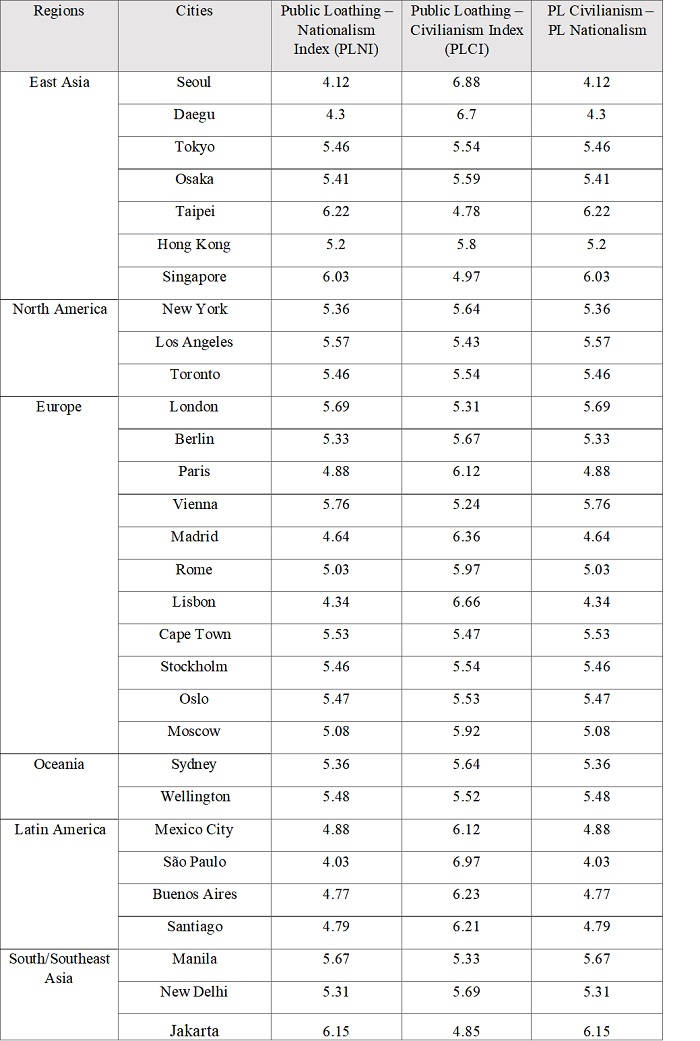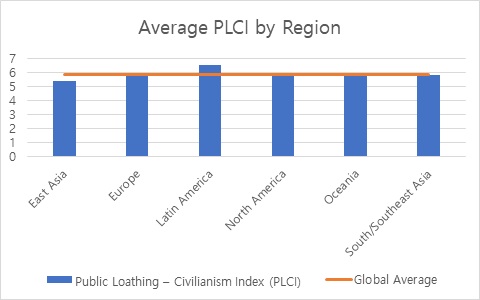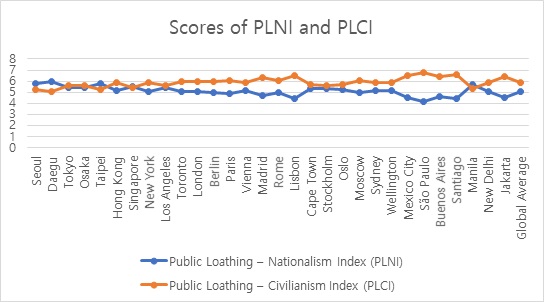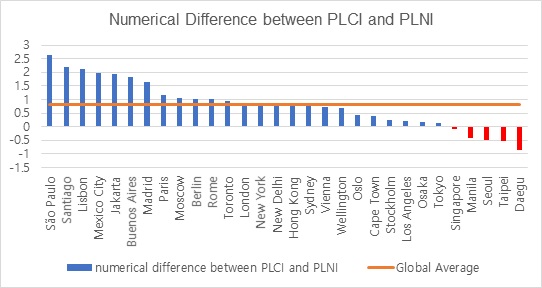Impact of Public Loathing of Coronavirus Patients during
the COVID-19
1.
Background
COVID-19
data analysis 5 series will focus on how emergency measurements during the
COVID-19 influence the nationalism around the world. To illustrate, we will
analyze the survey results of opinions of global citizens whether they perceive
a certain policy will lead a country to nationalism or citizens’ cooperation.
International cooperation is occasionally disturbed by countries with strong and
offensive nationalism, and sometimes, even a central government cannot control
the national outrage triggered by nationalistic sentiment. Even worse,
irrational nationalism would bring about racism and xenophobia, which severely
undermines the free and open market around the globe. On the contrary,
cooperation among citizens and governments would enhance the effectiveness of
abating the crisis and it will help fast recovery from an emergency to everyday
life.
At
the beginning of the COVID-19 crisis, there were many people who discriminate against
the Chinese, thinking that they are the origin of the horrible and frightful
disease. However, the phenomena may lead citizens into racism, which severely
deters cooperation in international society and violates human rights. In the
fear of this kind of end, many governments were very sensible on banning entry
to specific countries’ foreigners, constantly announcing that barring specific
foreigners may bring about public loath. Meanwhile, there are some people who are
loath on coronavirus confirmed patients and are afraid of being contaminated by
them. Then, what about many volunteers and medical teams out there fighting
against the virus and help cure those patients? What will the repercussion of
the public loathing of coronavirus confirmed patients?
2.
Research
Topic
In the time of the COVID-19 pandemic, it
is vital to sustaining social stability along with protecting the public
health. Information and debate in social network services (SNS) may lead public
opinion into public loathing towards some people, such as Chinese, coronavirus
confirmed patients. In this section, we will scrutinize how global individuals
think of the impact of public loathing during the COVID-19 crisis.
3.
Questionnaire
Used
Survey Question II-7: “While fighting
against a global pandemic like COVID-19, a country may begin to follow either a
state-centric and chauvinist path, or a democratic path based on citizen
participation. In terms of public loathing of coronavirus patients, what
direction do you expect the following policies/trends to take?”
The answers consist of a 10-point scale,
with higher scores indicating an individual believes the policy will lead
citizens to democratic/participatory citizenship and lower scores demonstrating
a person acknowledges the measure will result in citizens’
state-centric/chauvinistic.
4.
Major
Outcomes
Table 1: Public Loathing –
Nationalism Index (PLNI) and Public Loathing – Civilianism Index (PLCI) by
Citizens of 30 Global Cities

Respondents are asked to choose one score
to represent their ideas on the question, and the average scores of each city
indicate the Public Loathing – Civilianism Index (PLCI). It demonstrates that
citizens’ thoughts on the impact of public loathing of coronavirus patients,
and the higher the score is, the more individuals believe that public loathing
will lead to civilianism of a country. Meanwhile, the reverse scaling was used
in the Public Loathing – Nationalism Index (PLNI), which means that 11 minus PLCI
is the Public Loathing – Nationalism Index (PLNI). Similarly, the higher the PLNI
score is, the more a citizen holds that a certain phenomenon will lead a
country to nationalism. Finally, the numerical differences between the two scores
were calculated in order to show which side a city is more leaning towards. To
illustrate, the higher a numerical difference is, the more citizens of the city
assumes the public loathing of patients will lead people to democratic and
participatory citizenship.
Table 2: Average Public Loathing –
Civilianism Index (PLCI) by Region
|
Regions
|
Average Public Loathing – Civilianism Index (1 – 10)
|
|
East Asia
|
5.44
|
|
Europe
|
5.99
|
|
Latin America
|
6.58
|
|
North America
|
5.82
|
|
Oceania
|
5.86
|
|
South/Southeast Asia
|
5.88
|
The scores in the
table are the average Public Loathing –
Civilianism Index (PLCI) of
the global citizens by region. To be specific, the lowest score of 5.44 was
rated by East Asian citizens on average, and the highest score of 6.58 was
rated by Latin American citizens. There were various scores among distinguished
areas; nevertheless, all regions except East Asia think the public loathing
will result in civilianism in society since the scores of PLCI are higher than
the middle number of 5.50.
Figure 1: Bar Graph of Average Public
Loathing – Civilianism Index (PLCI) by Region

Figure 1 is the
visualized graph of Table 2, and the orange line is the world average Public
Loathing – Civilianism Index (PLCI). That
Latin American citizens think highly of the public loathing is evidenced by the
figure. However, these are generalized numbers by regions, and hence, for
further detailed analysis, let’s see each city’s score of PLCIs and PLNIs.
Figure 2: Line Graph of Public Loathing
– Nationalism Index (PLNI) and Public Loathing – Civilianism Index (PLCI)

This figure is a visualized version of
Table 1, and the most
outstanding finding of Figure 2 is that most cities believe that public
loathing may lead citizens to civilianism and facilitate cooperation and
participation in preventing the virus spread since most orange dots are above
the blue dots. Nonetheless, there are some cities that believe the public
loathing will result in state-centric nationalism, which obstructs
international cooperation, and these cities are including Seoul, Daegu, Taipei,
Singapore, and Manila.
Figure 3: Bar Graph of Numerical Difference
between Public Loathing – Civilianism Index (PLCI) and Public Loathing –
Nationalism Index (PLNI)

The differences
between PLCIs and PLNIs are drawn as a bar graph, shown in Figure 3. The orange
bar indicates the global average difference score (0.81). Cities with negative
numerical differences are marked with red bars, indicating citizens of that
city believe that the public loathing will lead a country to nationalism and
prevent cooperation among people and countries; yet, cities with blue bars
express that the public loathing is effective in a way of stimulating the
cooperation and participation on preventing the further spread of the
coronavirus. To be more specific, all Latin American people highly believe that
public loathing is positive in facilitating citizens’ cooperation and
participation, seeing their bars are longest among 30 global cities. Last but
not least, the “loathing” the word itself represents a negative meaning;
nevertheless, 25 out of 30 cities consider the public loathing has a positive
influence in furthering people’s civilized behavior.
5.
Summaries
and Further Tasks
a.
Data
analysis shows contradicting views on public loathing of coronavirus confirmed
patients, but the graphs also indicate that most cities believe the public
loathing has a positive meaning in democratic and cooperative behavior.
b.
Daegu,
Taipei, Seoul, Manila, and Singapore consider that the public loathing may lead
citizens to state-centric nationalism and hinders people from national and
international cooperation. Other than these five cities, other cities’ citizens
concluded that the public loathing is effective in encouraging people to be
more cooperative in abating the COVID-19 pandemic.
c.
Latin
American average PLCI is higher than the global average, illuminating the
region is more confident in public loathing phenomenon amid the COVID-19 crisis.
d.
The
study is limited to descriptive research, and therefore, a more detailed
explanative investigation is required to further understand the global citizens’
consciousness presented above. For instance, why global citizens are holding a positive
attitude towards public loathing, even though the loathing the word itself is
very negative? Why some cities, including Seoul, Daegu, Taipei, Manila, and
Singapore are holding the opposite opinion on public loathing compared to the other
25 global cities?
|